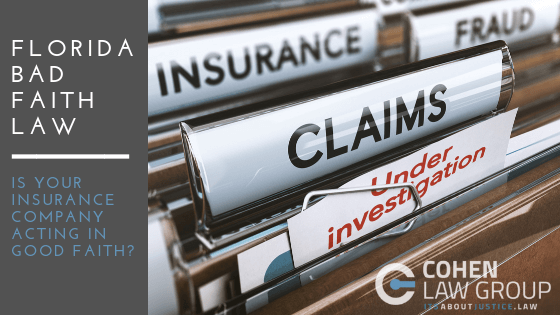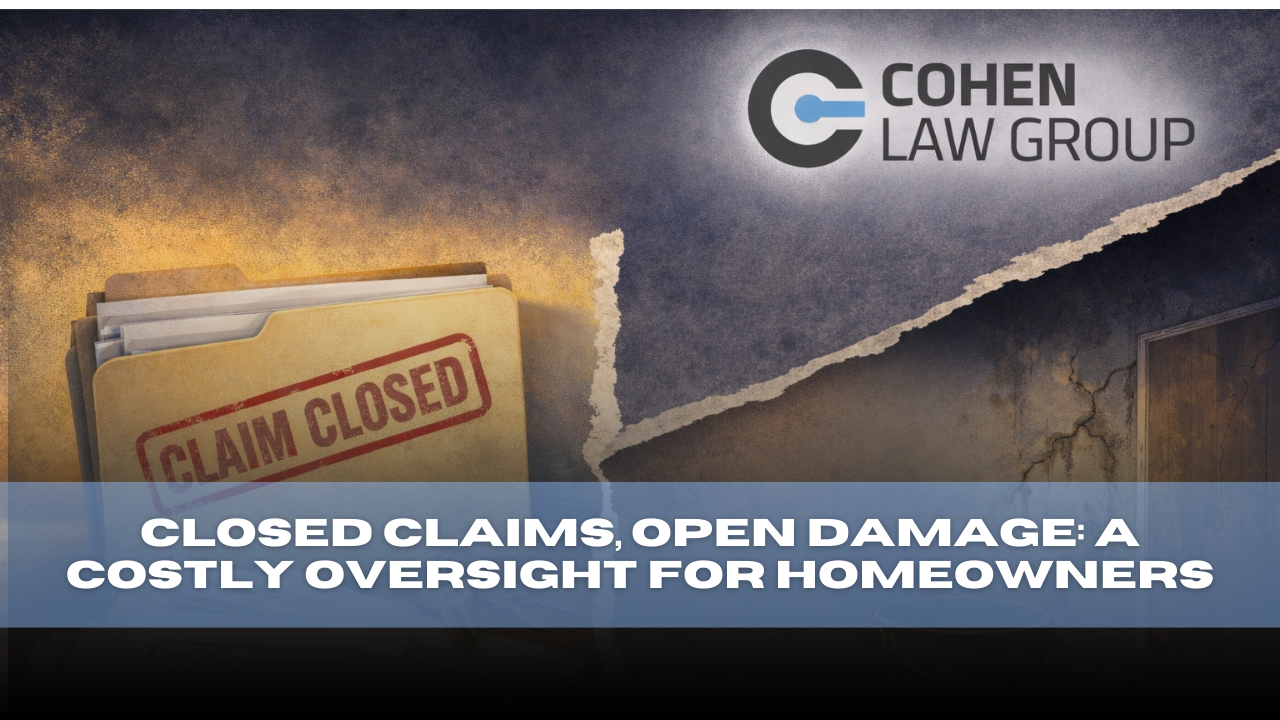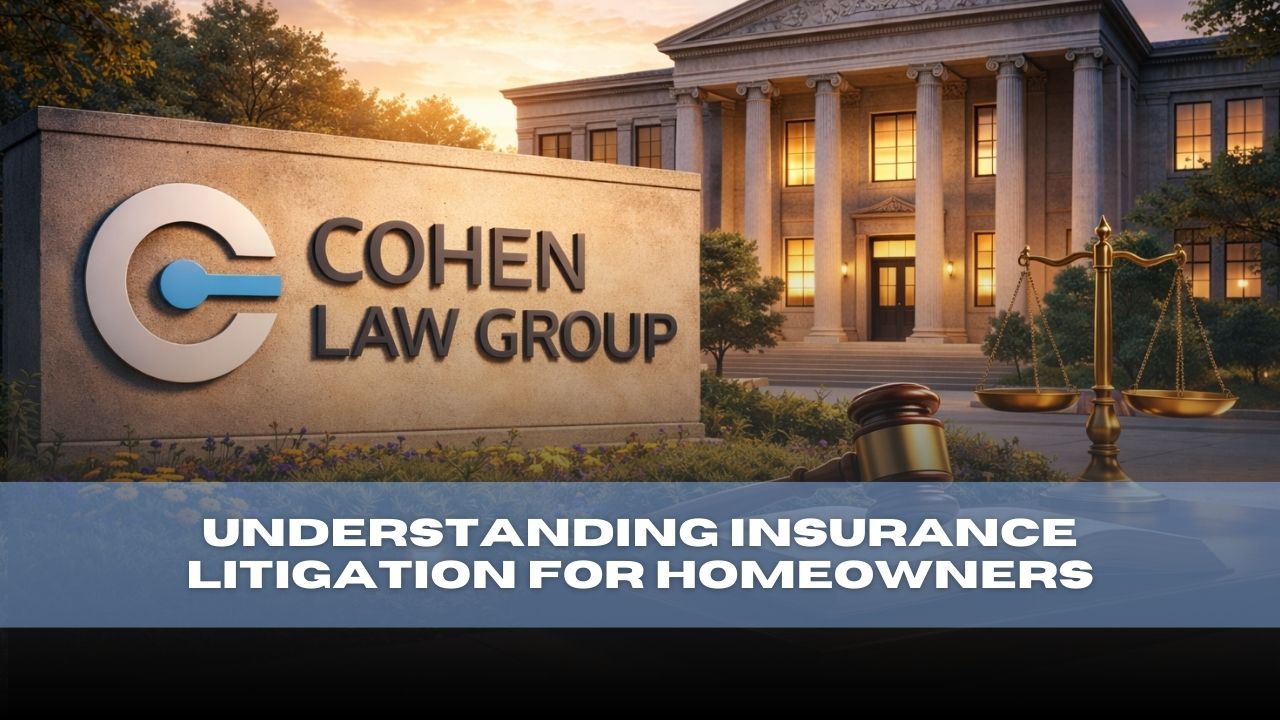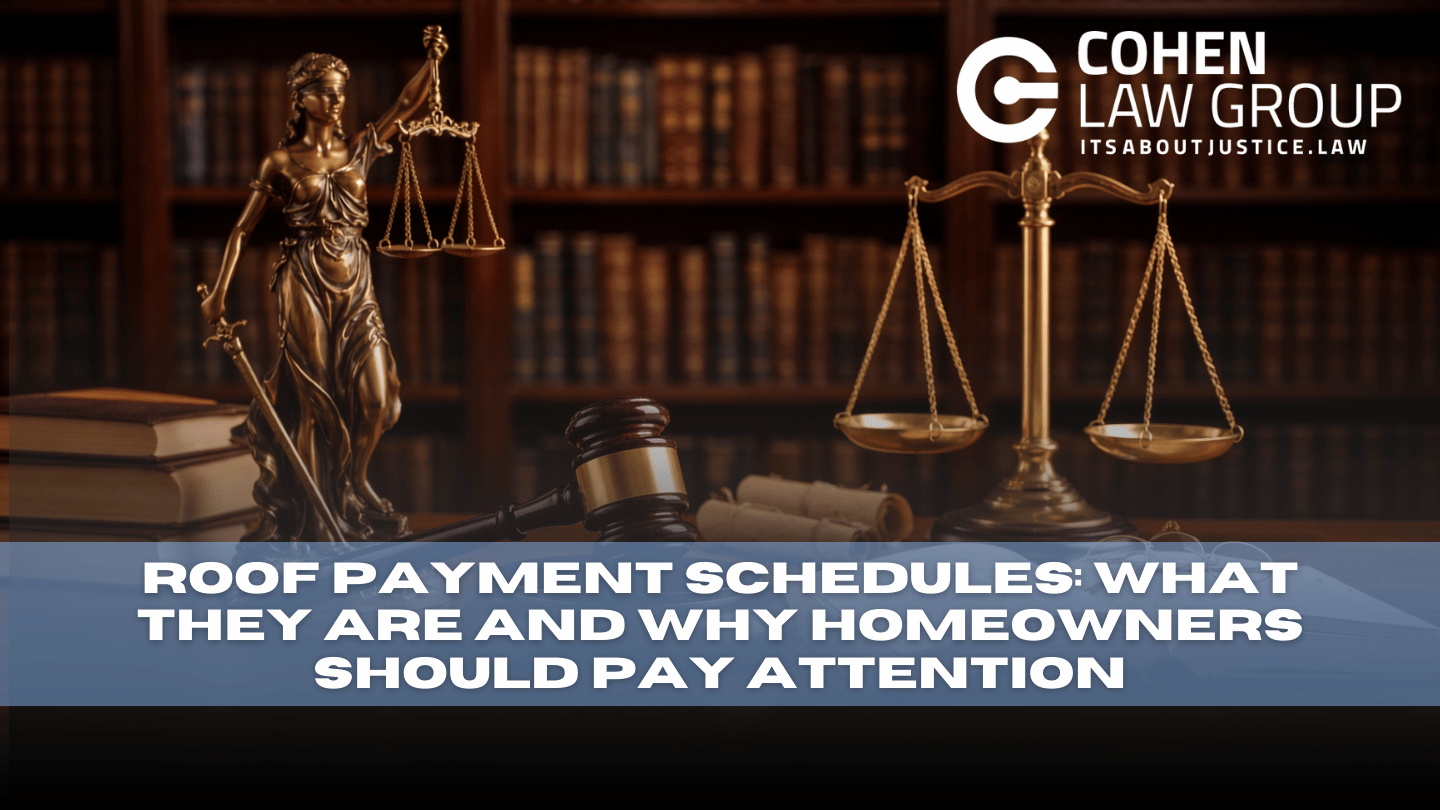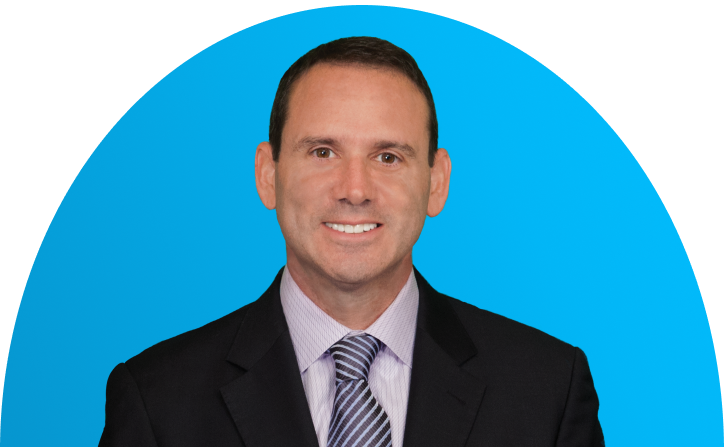Florida Bad Faith Law – Is Your Insurance Company Acting In Good Faith?
The current Florida bad faith law is comprised of both common law and Florida Statute. Under Florida Law, an insurer has a duty to exercise good faith in evaluating and examining the validity of claims against its insured.
Although Florida does recognize third party common law bad faith actions, Florida does not recognize a first-party common law bad faith cause of action. Most of Florida’s bad faith litigation stems from Florida Statute 624.155.
In this article I will outline Florida’s first-party bad faith Statute and applicable case law.
The Florida Supreme Court has found that the purpose of bad faith is to “protect insureds . . . who have fulfilled their contractual obligations by cooperating fully with the insurer in the resolution of claims” (1).
First Party Bad Faith
Florida’s first party bad faith claims are authorized only by statute. Fla. Stat. 624.155(1) creates the statutory cause of action for first-party bad faith which was created in 1982 to authorize Florida insureds to pursue first party bad faith claims against their insurers. Fla. Stat. 624.155 specifically states:
(1) Any person may bring a civil action against an insurer when such person is damaged: (b) By the commission of any of the following acts by the insurer:
1. Not attempting in good faith to settle claims when, under all the circumstances, it could and should have done so, had it acted fairly and honestly toward its insured and with due regard for her or his interests;
2. Making claims payments to insureds or beneficiaries not accompanied by a statement setting forth the coverage under which payments are being made; or
3. Except as to liability coverages, failing to promptly settle claims, when the obligation to settle a claim has become reasonably clear, under one portion of the insurance policy coverage in order to influence settlements under other portions of the insurance policy coverage.
Notwithstanding the provisions of the above to the contrary, a person pursuing a remedy under this section need not prove that such act was committed or performed with such frequency as to indicate a general business practice.
Conditions Precedent To Filing Suit For Bad Faith
A condition precedent (what must be done before a Florida insured can pursue a first party bad faith claim against their insurer) to bringing an action under this section is the preparation and service of what is commonly known as a Civil Remedy Notice.
You can learn more about filing a Civil Remedy Notice with the Florida Department of Financial Services here: https://apps.fldfs.com/CivilRemedy/.
Under Fla. Stat. 624.155(3)(a), the department and the authorized insurer must have been given 60 days written notice of the violation. If the department returns a notice for lack of specificity, the 60-day time period shall not begin until a proper notice is filed.
Under Fla. Stat. 624.155(3)(a)(b), The Civil Remedy Notice shall be completed on a form provided by the Florida Department of Financial Services and must state with specificity the following information:
1. The statutory provision, including the specific language of the statute, which the authorized insurer allegedly violated.
2. The facts and circumstances giving rise to the violation.
3. The name of any individual involved in the violation.
4. Reference to specific policy language that is relevant to the violation, if any. If the person bringing the civil action is a third party claimant, she or he shall not be required to reference the specific policy language if the authorized insurer has not provided a copy of the policy to the third party claimant pursuant to written request.
5. A statement that the notice is given in order to perfect the right to pursue the civil remedy authorized by this section.
Under this section, specificity is required. Upon the service of the Civil Remedy Notice to the insurer, the Insurer has sixty (60) days in which to “cure” the alleged violations by the payment of damages or the circumstances giving rise to the violations(s) are corrected (2). If the insurer pays the damages during the “cure period,” then there is no basis for the bad faith lawsuit (3).
In addition to filing a Civil Remedy Notice, an insured must first file suit under a theory of contractual liability and there must be a positive determination of that liability in favor of the insured usually in the form of a breach of contract claim wherein damages are awarded to the insured.
Although a determination of damages is necessary to state an insurer bad-faith claim, Fla. Stat. § 624.155 (Supp. 1988) also requires an insurer to respond within the sixty-day period to the notice of bad faith.
An insurer’s failure to respond within the sixty-day period will create a presumption of bad faith sufficient to shift the burden to the insurer to show why it did not respond. An insurer may have good reason for not wanting to settle for the amount demanded, but it is difficult to articulate a possible reason not to respond within sixty days (4).
Potential Actions Evidencing Bad Faith
Florida courts consider the following under a “totality of the circumstances” analysis when looking at potential and alleged violations of failing to deal with the insured in good faith (5). The following is not an all-inclusive list but will provide you an understanding of what the court will look towards.
1. Not attempting in good faith to settle claims when, under all the circumstances, it could and should have done so, had it acted fairly and honestly toward its insured and with due regard for her or his interests;
2. Making claims payments to insureds or beneficiaries not accompanied by a statement setting forth the coverage under which payments are being made;
3. Except as to liability coverages, failing to promptly settle claims, when the obligation to settle a claim has become reasonably clear, under one portion of the insurance policy coverage in order to influence settlements under other portions of the insurance policy coverage.
4. When faced with multiple claims, failing to fully investigate, keep insureds fully informed, failing to settle as many claims as possible within the policy limits and failing to minimize the possibility of excess judgments against an insured.
5. Typically, under first party claim, the court tends to focus on delayed payments, improper denials of claims, and inadequate investigation.
Potential Types Of Damages Available Under Florida’s Bad Faith Statute
Under Florida Statute 624.155, consequential damages are available in a first-party bad faith suit. These damages include those in which are “reasonable foreseeable” and are proximately caused by the insurer as a result of the violation listed in the above Civil Remedy Notice. These damages could include monies beyond the policy limits.
Examples of these damages include attorney’s fees and costs, interest and additional damages caused as result of the insurance company’s actions.
In addition to consequential damages, Florida also allows for the award of punitive damages, which can be awarded in both statutory and common law bad faith cases (6).
In order for punitive damages to be awarded, Florida Statute 624.155 requires the following:
Acts giving rise to the violation occur with such frequency as to indicate a general business practice and these acts are:
(a) Willful, wanton, and malicious;
(b) In reckless disregard for the rights of any insured; or
(c) In reckless disregard for the rights of a beneficiary under a life insurance contract.
Florida Statute 768.73 limits punitive damages to three times the amount of the compensatory or $500,000, whichever is greater.
As I’m sure you can see, all of this is fairly complicated.
Don’t fight the insurance companies alone and don’t let them handle your claim in bad faith. If you feel as though your claim was handled in bad faith, call us today to learn your rights and speak with an attorney today!
COHEN LAW GROUP
References:
(1) Berges v. Infinity Ins. Co., 896 So. 2d 665, 682-83 (Fla. 2005)
(2) Fla. Stat. 624.155(3)(d)
(3) Talat Enterprises, Inc. v. Aetna Cas. & Surety Co., 753 So. 2d 1278 (Fla. 2000)
(4) Imhof v. Nationwide Mut. Ins. Co., 643 So. 2d 617, 617, 1994 Fla. LEXIS 733, *1, 19 Fla. L. Weekly S 257
(5) State Farm Mut. Auto. Ins. Co. v. LaForet, 658 So. 2d 55 (Fla. 1995). See also, Boston Old Colonial Insurance Company v. Gutierrez, 386 So. 2d 783 (Fla. 1980) and Harvey v. Geico General Insurance Co., 2018 Fla. LEXIS 1705, 2018 WL 4496566 (Fla. 2018)
(6) Fridman v. Safeco Ins. Co., 185 So. 3d 1214, 2016 Fla. LEXIS 394, 41 Fla. L. Weekly S 62.
DISCLAIMER: This website is for informational purposes only and does not provide legal advice. Please do not act or refrain from acting based on anything you read on this site. Using this site or communicating with Cohen Law Group through this site does not form an attorney/client relationship. This site is legal advertising. Please review the full disclaimer for more information by clicking here.

